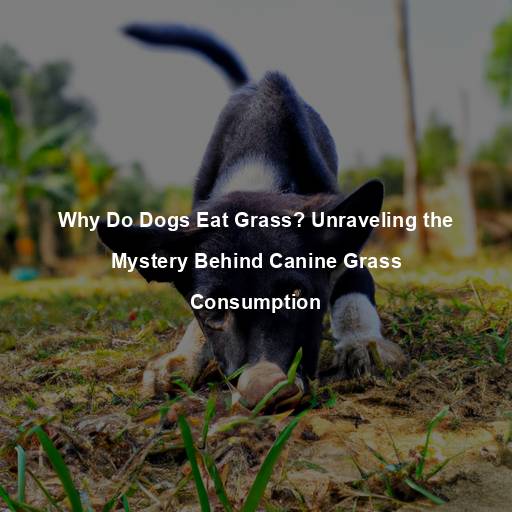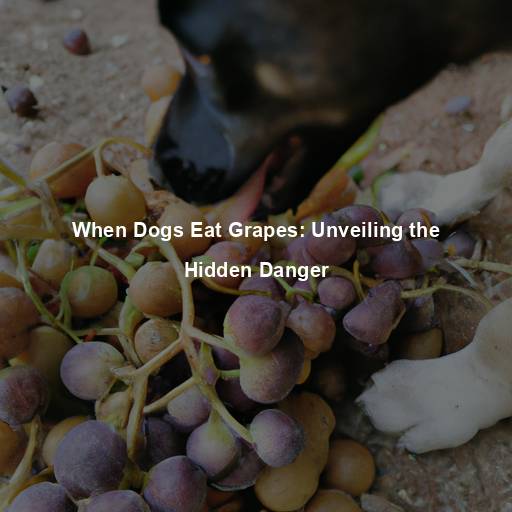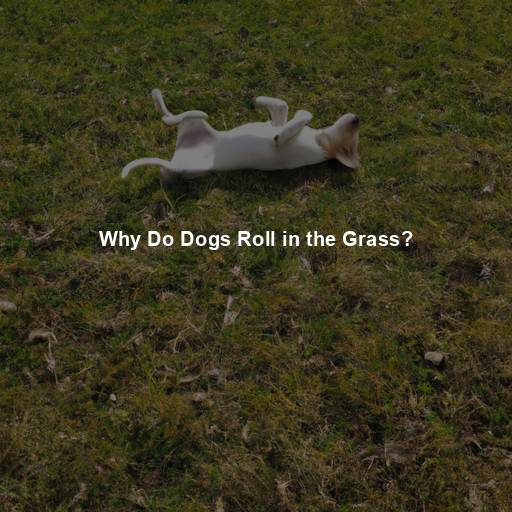Why Do Dogs Eat Grass? Unraveling the Mystery Behind Canine Grass Consumption
Last Updated on August 6, 2023 by Evan
Contents
- 1 The Curious Behavior of Dogs
- 2 The Potential Risks and Precautions
- 3 Understanding Your Dog’s Unique Needs
- 3.1 Consult with Your Veterinarian
- 3.2 Provide a Balanced Diet
- 3.3 Environmental Enrichment
- 3.4 Create a Safe Outdoor Environment
- 3.5 Unveiling the Behavioral Patterns
- 3.6 The Role of Instinct and Genetics
- 3.7 The Quest for Nutritional Balance
- 3.8 The Hunt for Digestive Relief
- 3.9 The Role of Boredom and Enrichment
- 3.10 Investigating Environmental Factors
- 3.11 The Importance of Observation and Monitoring
- 3.12 Embracing the Quirks of Canine Nature
- 4 FAQs for Where Do Dogs Eat Grass
- 4.1 Do all dogs eat grass?
- 4.2 Why do dogs eat grass?
- 4.3 Is it safe for dogs to eat grass?
- 4.4 Can eating grass be harmful to dogs?
- 4.5 Should I be concerned if my dog eats a lot of grass?
- 4.6 Can eating grass be a sign of an underlying health problem?
- 4.7 How can I prevent my dog from eating grass?
- 4.8 Is there any alternative to grass for my dog to chew on?
The Curious Behavior of Dogs
Our furry friends, dogs, never fail to captivate us with their unpredictable antics and peculiar mannerisms. Amongst the panoply of enigmatic behaviors they exhibit, the act of consuming grass often leaves pet owners scratching their heads in bewilderment. Whether it be during their routine strolls or amidst the serene confines of our own well-manicured gardens, dogs frequently engage in this intriguing behavior. But what lies behind this enigmatic inclination?
An Innate Canine Instinct
To understand why dogs eat grass, we must delve into their ancestral past. Dogs are descendants of wolves, who were omnivorous creatures. Wolves often consumed plant matter, including grass, to obtain essential nutrients and dietary fiber. This ancestral instinct may still be present in our domesticated dogs, leading them to graze on grass from time to time.
Seeking Relief from Digestive Discomfort
There’s a peculiar mystery surrounding why our furry four-legged companions occasionally develop a sudden taste for grass. Could it be nature’s way of helping them find relief from those pesky tummy troubles that inevitably strike? Some experts suggest that when our dogs are feeling a bit under the weather in the digestive department, they instinctively seek solace in the comforting embrace of grass. This humble plant, having a trick or two up its sleeve, might just trigger a spontaneous vomit session, acting as a sort of natural purge for any unsavory substances or irritants that may be causing their internal ruckus.
Nutritional Deficiencies
Dogs are naturally curious creatures, and their grass-eating behavior may be an indication of nutrient deficiencies in their diet. While dogs are primarily carnivorous, they may still have a craving for certain plant-based nutrients that are lacking in their regular meals. Grass can provide dogs with additional fiber, vitamins, minerals, and phytonutrients that they may be seeking. However, it’s essential to ensure that their overall diet is balanced and meets their nutritional needs.
Boredom or Behavioral Enrichment
Just like us humans, our furry companions can experience moments of utter boredom, yearning for that mental and physical boost. Surprisingly enough, dining on grass can actually serve as a dog’s very own form of amusement and enrichment, particularly during those long, solitary stretches in the house. There’s something about the texture and sensation of grass between their teeth that tickles their senses and keeps them occupied, effortlessly whisking away their boredom. However, it’s vital for us pet parents to ensure our four-legged friends have already been treated to ample doses of stimulating activities and exercise, so they don’t go overboard with their newfound grassy pastime.
The Potential Risks and Precautions
When it comes to our furry friends indulging in a little green snack, it may seem like business as usual. However, there are crucial factors that responsible pet owners must remember. Let’s shed some light on the perplexing world of dogs and grass consumption, and uncover some essential pointers to keep in mind for the well-being of our beloved companions.
Pesticide and Chemical Exposure
When it comes to letting your furry friend chomp on some green goodness, it’s absolutely essential to play the safe card and double-check that the grass they’re nibbling on is as clean as can be. Keep an eagle eye out for any potentially hazardous pesticides, fertilizers, or other sneaky chemicals that may have found their way onto the grass. Trust me, folks, these substances can wreak havoc on your pupper’s health if they accidentally swallow them. And hey, if you find yourself lost in a maze of uncertainty regarding your local grass situation, it’s definitely better to be overly cautious and keep your doggo away from it.
Toxic Plant Consumption
As dogs explore the great outdoors, they come across a myriad of flora, not limited to just grass. However, it’s important to note that not all plants are dog-friendly, as some can wreak havoc on their four-legged companions. From mild tummy troubles to potentially serious repercussions, the toxic plants that lurk in our surroundings can pose a perplexing hazard. To ensure your pooch stays safe, take the time to acquaint yourself with the prevalent toxic vegetation in your area and take proactive measures to prevent any unwanted ingestion.
Parasite Transmission
Did you know that grass, the humble green carpet of nature, can actually be a hotbed of unwanted guests? Yes, I’m talking about those tiny terrors called fleas, ticks, and intestinal worms. So, when you give your furry friend the freedom to feast on the tasty blades of grass, it’s essential to be on your guard and protect them from these pesky parasites. Keeping up with regular deworming and using effective flea and tick preventatives will not only keep your pup happy and healthy but also give you peace of mind.
Potential Gastrointestinal Obstruction
When it comes to our furry friends and their quirky eating habits, the topic of grass consumption can be a bit of a head-scratcher. While the majority of dogs can handle a munch or two without any issues, there’s a curious twist to this tale. If your canine companion has developed a sudden keenness for grass and is displaying signs of tummy trouble like a real-life riddle, it’s vital to act swiftly. Reach out to your trusted veterinarian for a short and sweet solution to this fuzzy conundrum.
Understanding Your Dog’s Unique Needs
Understanding why dogs eat grass can be a perplexing puzzle for responsible owners. The burst of curiosity surrounding this peculiar behavior stems from the recognition that each dog has their own enigmatic reasons for indulging in the green foliage. By astutely observing their actions and meticulously monitoring their overall vitality, dog owners can unlock valuable insights into their beloved pet’s idiosyncrasies, uncovering hidden clues to their unique needs and preferences. Delve into this enigma with our enlightening tips that will whisk away the fog of confusion, empowering you to unravel the mystery that lies behind your canine companion’s penchant for dining on nature’s carpet.
Consult with Your Veterinarian
If you have concerns about your dog‘s grass-eating behavior or if you notice any unusual symptoms, it’s always best to consult with your veterinarian. They can assess your dog’s overall health, provide tailored advice, and address any underlying health issues that may be contributing to their grass consumption.
Provide a Balanced Diet
Taking care of your beloved furry friend’s diet is of utmost importance when it comes to ensuring their overall health and happiness. It’s crucial to seek guidance from your trusted veterinarian to determine the perfect diet that caters to your dog’s unique needs, considering factors such as age, breed, and specific nutritional requirements. By providing a well-rounded and nourishing diet, you can address any potential cravings or deficiencies that might prompt your four-legged companion to snack on grass. Set them up for a lifetime of vibrant well-being with a carefully tailored culinary journey.
Environmental Enrichment
Keeping your dog entertained and mentally stimulated is crucial in preventing boredom and those curious grass-eating habits. From engaging in regular play sessions to introducing interactive toys and activities like puzzle feeders and scent games, there are plenty of ways to keep your furry friend’s mind and body active. Providing both mental and physical stimulation will not only ward off boredom but also ensure a happy and contented canine companion.
Create a Safe Outdoor Environment
As a responsible pet parent, it’s essential to give your furry friend a safe and enjoyable outdoor experience. Take a moment to survey your surroundings, eliminating any lurking dangers that could pose a threat to your dog’s well-being. From sinister plants to hidden chemicals, it’s crucial to be vigilant in safeguarding their playtime paradise. Don’t forget about the invisible threats that may lie within the grass or shrubbery.
Unveiling the Behavioral Patterns
Have you ever wondered why our furry friends engage in the curious activity of munching on grass? It’s a behavior that has puzzled dog owners for years, and understanding the reasons behind it requires a closer inspection of their behavior and physiological needs. So, let’s embark on a fascinating journey to unravel this enigma and unearth some additional factors that might play a part in this peculiar habit.
The Role of Instinct and Genetics
Throughout history, dogs have undergone a fascinating transformation from their wolf ancestors. Although domestication has shaped their behaviors and eating habits, there are still hints of their primal instincts hidden within. Back when wolves roamed the wild, they would occasionally incorporate plant-based goodness into their diet as a way to sustain their nutritional needs. And guess what?
The Quest for Nutritional Balance
The mysterious allure of grass for our canine companions continues to baffle even the most seasoned dog owners. Beyond mere instinct, some experts suggest that dogs may be drawn to grass due to an innate desire to satisfy their unique nutritional requirements. Despite the wide array of nutritious dog food available in the market, there seem to be certain dietary gaps that our furry friends are determined to fill. Could it be that grass holds the key to unlocking these canine cravings for fiber, vitamins, and minerals?
The Hunt for Digestive Relief
When dogs find themselves in the midst of tummy troubles, they often resort to a peculiar solution – munching on grass like it’s the latest health trend. This leafy remedy, believe it or not, actually provokes the gag reflex and prompts them to throw up, facilitating the expulsion of any pesky irritants or unappetizing substances lurking in their bellies. Nevertheless, it’s crucial to draw a line between sporadic grass munching for relief and habitual vomiting, as the latter necessitates a trip to the vet’s office for further investigation and guidance.
The Role of Boredom and Enrichment
Dogs are intelligent and social animals that thrive on mental and physical stimulation. In the absence of adequate enrichment, dogs may resort to grass consumption as a form of self-entertainment or to alleviate boredom. Providing your dog with engaging activities, interactive toys, and regular exercise can help minimize their inclination to eat grass out of sheer boredom.
Investigating Environmental Factors
The environment in which dogs live and interact can also influence their grass-eating behavior. Dogs that spend a significant amount of time outdoors, particularly in natural environments such as parks or open fields, may encounter grass more frequently and be more inclined to indulge in this behavior. Additionally, exposure to other dogs or animals that engage in grass consumption can also influence a dog’s own behavior.
The Importance of Observation and Monitoring
Being a loving and conscientious pet parent, it’s imperative to keenly observe your furry friend’s actions and keep a vigilant eye on any alterations or potential concerns stemming from their grass-eating tendencies. To gain a better understanding and effectively regulate this behavior, consider these valuable pointers:
-
Actively Engage: Spend quality time with your pooch, engaging them in stimulating activities to redirect their attention from grazing on grass. A game of fetch or a long walk can work wonders!
-
Nutritional Balance: Ensure your dog’s diet is nutritionally balanced, as a deficiency in certain nutrients may lead to grass consumption. Consult with your veterinarian to determine if any dietary adjustments are necessary.
-
Mind the Environment: Pay close attention to the area where your dog roams, considering any potential exposure to harmful substances like pesticides or toxic plants. Limit access to areas treated with chemicals to safeguard their well-being.
-
Seek Veterinary Advice: Should your dog display persistent or unusual grass-eating behaviors, consult a veterinarian to rule out any underlying medical conditions that may be causing this perplexing habit.
Remember, to be an astute dog owner is to be receptive to your pup’s needs, and by following these tips, you can navigate the enigma of grass-eating and ensure your dog’s overall health and happiness.
Maintain a Journal
Keep a record of when and how often your dog consumes grass. Note any accompanying behaviors or symptoms, such as vomiting, diarrhea, or changes in appetite. This journal can help identify any patterns or triggers that may be influencing your dog’s grass consumption.
Consult with a Veterinarian
If you have concerns about your dog‘s grass-eating behavior or if it becomes excessive or problematic, consult with your veterinarian. They can conduct a thorough examination, assess your dog’s overall health, and provide professional guidance based on their individual needs.
Evaluate the Diet
Ensure that your dog’s diet is well-balanced and meets their nutritional requirements. Consult with your veterinarian to determine if any dietary adjustments or supplements may be necessary to address potential nutrient deficiencies that could be driving their grass consumption.
Create a Safe Environment
Keeping a watchful eye over your yard or outdoor areas is key to ensuring your furry friend’s safety. Take the time to thoroughly examine and eliminate any potential threats, ranging from toxic plants to hazardous chemicals. Prioritize your pup’s wellbeing by ridding the grass they roam on of harmful pesticides or fertilizers, ensuring a worry-free environment.
Offer Alternative Chew Toys
It’s time to unleash your furry friend’s inner chew connoisseur with a carefully curated collection of delightful and secure chew toys. Keep those pristine lawns intact by diverting their nibbling tendencies towards these pawfect alternatives. Not only will this satisfy their primal craving to nibble, but it also ensures their mental and physical well-being remains at its peak.
Embracing the Quirks of Canine Nature
While the reasons behind why dogs eat grass may not be entirely conclusive, it’s essential to approach this behavior with understanding and care. Dogs are complex creatures with individual needs and preferences. By observing, analyzing, and adapting to their unique behaviors, we can deepen our bond with our loyal companions and ensure their well-being. Remember, the grass-eating habit of dogs is just one of the many intriguing facets that make them such fascinating creatures.
FAQs for Where Do Dogs Eat Grass
Do all dogs eat grass?
No, not all dogs eat grass. While it is a common behavior, there are some dogs who show no interest in consuming grass. The propensity to eat grass may vary among individual dogs and can depend on factors such as breed, age, and overall health.
Why do dogs eat grass?
The exact reason behind why dogs eat grass is not entirely understood. It is believed that dogs may eat grass as a means to fulfill a natural instinct, such as seeking additional nutrition or aiding digestion. Some experts suggest that dogs may eat grass when they have an upset stomach, as grass can induce vomiting, which may provide them relief.
Is it safe for dogs to eat grass?
When it comes to dogs and their dietary habits, the topic of grass consumption often arises. While many believe that it poses no major harm to our furry friends, it is essential to exercise caution and consider certain factors. The quality of the grass that dogs munch on must be closely monitored to avoid any potential exposure to harmful chemicals or pesticides. Additionally, owners must remain vigilant about their surroundings, ensuring that their four-legged companions are not exposed to sharp objects or toxic plants that could pose a threat. The perplexing nature of doggy diets keeps us on our toes as responsible pet guardians.
Can eating grass be harmful to dogs?
While munching on a patch of grass may seem harmless, there are a few caveats pet owners should be aware of. Although unlikely, there is a slim chance that dogs might stumble upon some toxins or chemicals lingering on the grass, particularly if it has recently been treated with harmful substances. Moreover, gorging on grass may cause irritation or even injury to their delicate gastrointestinal tract, leading to pesky symptoms like throat discomfort or potential blockages if the grass is unusually long.
Should I be concerned if my dog eats a lot of grass?
If your dog occasionally eats grass in small amounts, there is usually no need to worry. However, if the grass-eating behavior becomes excessive or your dog shows other signs of discomfort, it is essential to consult a veterinarian. They can help determine if there are any underlying health issues or if the behavior needs further investigation.
Can eating grass be a sign of an underlying health problem?
While grass eating can be a normal behavior for some dogs, excessive or compulsive grass consumption can sometimes indicate an underlying health problem. If your dog consistently eats grass in large quantities or exhibits other abnormal symptoms such as vomiting, diarrhea, or lack of appetite, it is recommended to seek professional veterinary advice to rule out any potential health issues.
How can I prevent my dog from eating grass?
When it comes to your furry friend’s grass-eating habits, the jury is still out on whether it’s a cause for concern. While some experts suggest that it may not be an issue unless there are underlying health problems, there are ways to deter your pooch from munching on the green stuff. Ensuring they have a well-rounded diet, stimulating their minds with engaging toys, and giving them plenty of opportunities to burn off energy through exercise can redirect their attention elsewhere. Teaching them obedience commands like “leave it” or “drop it” can also prove beneficial in curbing their access to grass. It’s all about finding what works best for your individual pup!
Is there any alternative to grass for my dog to chew on?
Yes, there are alternative options for dogs to chew on that can divert their attention from eating grass. Safe and appropriate chew toys, dental chews, or specially designed dog treats can provide a satisfying chewing experience while minimizing the ingestion of grass. Offering these alternatives can also help promote good dental health and prevent destructive chewing behaviors in dogs.







